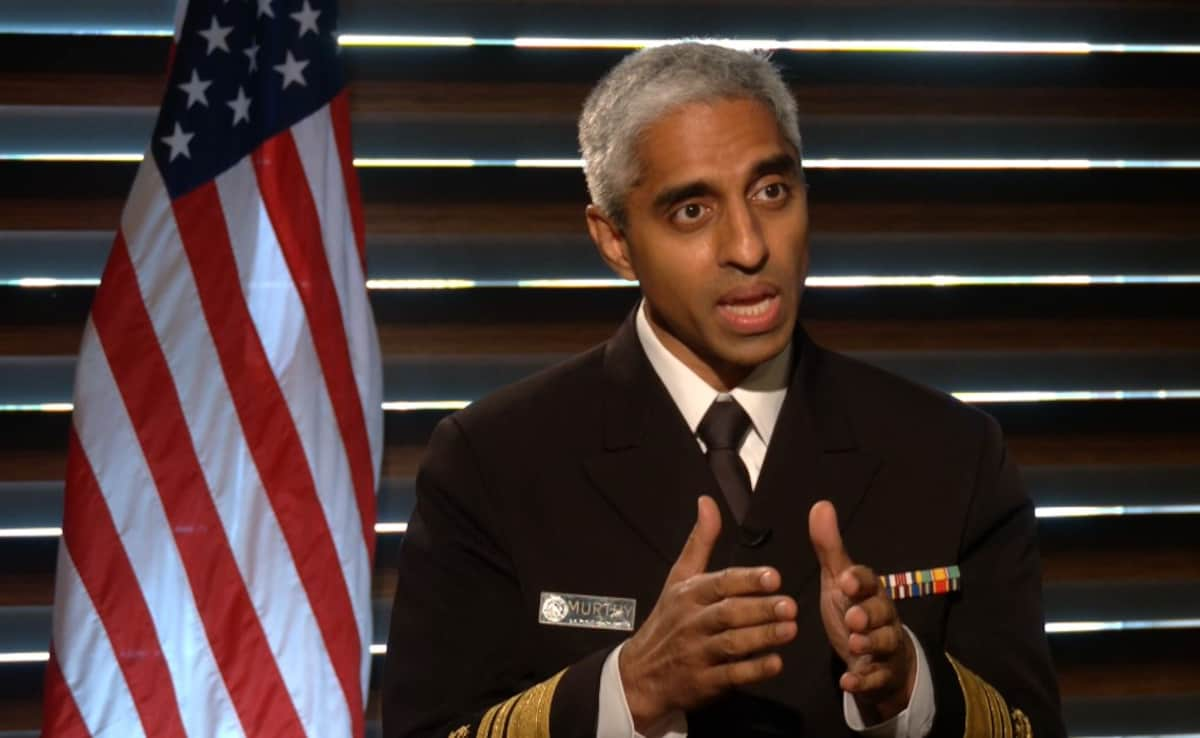There is a direct connection between social media use and mental health, especially among teenagers, the US Surgeon General Vice Admiral Vivek Murthy told NDTV today. He said that his office had even issued an advisory in this regard, appealing for more focus on this very concerning issue.
The US Surgeon General is the doctor to all of the United States of America. The Surgeon General is consulted by the President of the US on all public health issues and health-related emergency matters. It is one of the topmost posts in the US and is responsible for America's overall healthcare system, new technology in the sector, and scientific advancement in medicine.
The current Surgeon General, Vice Admiral Vivek Murthy spoke exclusively to NDTV today on a range of issues, including a growing mental health crisis globally and how social media impacts it.
"There is a need to protect our children," the Surgeon General said, adding that it is a priority for him and his department to "make mental health the priority that it needs to be." He said that "Many countries are struggling with mental health crisis, with many cases of depression, anxiety, and sadly suicide."
'THE STIGMA'
Vice Admiral Murthy explained that his advisory aims to focus on the "stigma around mental health", which he says "makes it harder for patients to talk about it at home with their families, and makes their struggle harder because not often can they ask for the help they need."
As an increasing number of young adults are battling mental health issues globally, the top doctor of the United States said, "Fundamentally what we have to do is to see mental health for what it is – It is part of our overall health, and mental health is just as important to a person as their physical health is, and must be treated with the urgency and priority that it deserves."
'GENERATIONAL DIFFERENCES, COMMUNITY OUTLOOK'
"Older generations are not always used to talking about mental health issues," the Surgeon General said, acknowledging that "different generations look at mental health differently, as do different communities."
"While older generations do not talk about it openly, the younger generations are far more open and sensitive to mental health challenges," he said.
Speaking about cultural views on mental health and the stigma attached to it, Vice Admiral Murthy said, "We see a lot of cultural differences when it comes to viewing mental health issues. My family is originally from India, and the Indian-American community which I grew up in, we never spoke about mental health issues. In fact, it was something that was seen as a source of shame."
Giving an example of his own experience of the stigmatisation of mental health challenges, he said, "I had an uncle who sadly lost his life to suicide. I remember the sense of shame around the family that something like this had happened. There was so much concern about telling other people what had happened because of what they would think about the family. That kind of stigma and the message it sends to both young and old people, is that these issues are just not okay to talk about."
"We need to change this. I aim for a day where we can talk about the mental health issues we face just as easily as we would about a sprained ankle or heart disease. We need to talk about it with the same amount of openness" he said.
'BUILDING BLOCKS OF A FULFILLING LIFE'
Young people are under tremendous pressure and stress of performing well in life, said the top doctor, and so, I asked a lot of young adults what success means to them, he added.
"We need to ask ourselves what we are doing to define success for young people in order to help them having a fulfilling life. When I spoke to young people in the US, many of them said they feel they are being asked to hustle behind a definition of success that is largely dependent on – 'How much money you make', 'How much fame you can acquire', and 'How much power can you attain' – And while there is nothing wrong in wanting to amass power, fortune and fame, if we feel that that is what is going to lead to long-term fulfilment, unfortunately life's experiences and challenges tends to make us feel the other way," he said.
"So, if we really want our children to be truly and deeply fulfilled, the thing we need to increasingly think about is – How can we help them build a life that is focussed on meaning, on purpose, on service, and on community – because these are the building blocks of fulfilment that we all ultimately want for our children," he explained.
THE ESSENTIAL INGREDIENT TO MANAGE STRESS
Delving on the issue of stress and the pressures faced by young individuals, Vice Admiral Murthy said, "We need to see and understand where the pressures being faced by our children are coming from. We also need to mitigate and manage them to make the environment that our children are growing up in much more hospitable and welcoming."
Explaining his statement, he added, "One of the things we know is that pressure is a lot easier to deal with – stress in general, is a lot easier to deal with when we have social support around us. Which is why the issues of loneliness and isolation being a broader epidemic is a serious problem in the US and increasingly across the world."
SUICIDE – THE DEEPEST PAIN, A GLOBAL EPIDEMIC
Speaking about an ever-increasing suicide rate globally, the Surgeon General said, "Suicide is one of the most painful consequences of all of the broader mental health challenges we are facing today. The thought of losing your child to suicide is the deepest pain for any parent to deal with."
He further explained that "Suicide deaths have increased significantly across the world in the last two decades." This, he says, is due to several reasons:
- Loneliness has become a profound issue among children. It affects the entire population, but is hitting young people the hardest. It is now an epidemic across the world.
- The impact of violence and the fear of violence – Over 50 per cent children in the US now fear a school shooting.
- Negative news and mobile phones – Most children today carry or have access to smartphones that are constantly buzzing with negative and violent headlines which make them feel like their life and the future is bleak because nothing positive is happening around the world.
- Most of all, Technology and Social Media – Children are, on average, spending more than 3 hours a day on social media. By doing so, they face double the risk of depression and anxiety. It is one of the many reasons we have to address the harms of social media.
'WE'VE FAILED AS A SOCIETY'
Social media algorithms are what make these platforms so addictive. These algorithms have a direct impact on the brain and the hormones secreted by it. But there are no laws to keep these algorithms in check. While even smoking or drinking have their own set of laws to not pose a risk to the public, social media firms have no such rules to bind them from using their algorithms indiscriminately.
Elaborating on the challenges faced in combating the harms of social media, the Surgeon General said, "For the last 20 years that social media has been around, we have broadly failed as a society to ensure that social media companies meet safety standards."
Giving the example of cars, Vice Admiral Murthy explained that "Cars have a basic level of safety and standards in place. These standards ensure that that brakes are working, the seat belts and the engine are in sound condition, the frame of the car is such it protects the occupants of the vehicle. But we do now have anything like that, especially in the US, when it comes to checks and balances for social media. There are no safety standards to protect children in particular from its harmful effects."
"The entire burden of checks and balances for social media are entirely on kids and parents. Not only is that unfair, but is ineffective, and we can see that from how it is manifesting today," he said.

